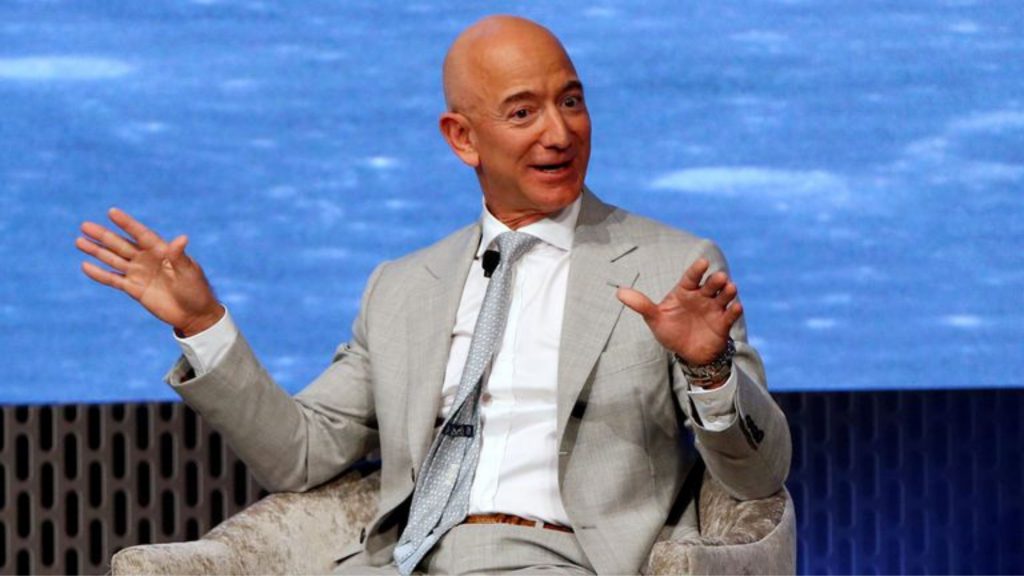On Thursday evening, Jeff Bezos, the chief executive of Amazon and the owner of The Washington Post, published a post on the website Medium that—

—well, it’s hard to describe what it did, really. Bezos accused the owner of the National Enquirer of “extortion and blackmail,” alleging that the supermarket tabloid threatened to publish revealing photos of Bezos if he did not call off an investigation into its practices. According to an email that Bezos reproduces in full, the incriminating material included a “below-the-belt selfie—otherwise colloquially known as a ‘d*ck pick’” of Bezos.
This was only one of several emails that Bezos reproduces in the post. He says that they were all sent by executives and attorneys at the Enquirer’s parent company, American Media Inc., or AMI.
That is the content of the post, at least. But Bezos’s post did something that has become common in this cultural-political moment. His blog post is, well, a blog post. But it is also so salacious, so bizarrely stimulating, that it overwhelms the thinking brain and presents instead as pure spectacle. In a little more than 2,000 words, Bezos seemed to rip every headline out of the newspaper and bind them in an eternal neon braid: the mighty power of billionaires, the immiseration of American journalism, the thin smudge of porniness that smartphones have layered onto reality—all of that, and President Donald Trump (who is a close friend of David Pecker, AMI’s chief executive), and the corruption and journalist-murdering malice of the Saudi government, which Bezos alleges is wrapped up in his story “for reasons still to be better understood.” Bezos once founded the Everything Store; now he has given us the Everything Story.
Inseparable from this too-much-too-muchness is Bezos’s writing style. Though Bezos employs (through The Washington Post) some of the best editors in journalism, he appears to have used none of them in composing his post. As such, it is choppy, jargon-filled, and a little hard to follow. Bezos lurches between past and present tense. He introduces an aside about the financial success of Amazon, then starts a new paragraph with: “OK, back to their threat to publish intimate photos of me.” He refers to his ownership of the Post not as “complicating” (which is a word), but as a “complexifier” (which isn’t).
Not that the post is unreadable—it is, instead, quite literary. It can feel inescapably Dickensian: AMI’s priapic owner is repeatedly called “Mr. Pecker.” It has the silver-age shabbiness of noir: One of the alleged emails refers to “a photograph of [Lauren Sanchez] smoking a cigar in what appears to be a simulated oral sex scene.” Sometimes it even gives way to the disorganized, business-school poignancy of George Saunders. Writes Bezos: “My stewardship of the Post and my support of its mission, which will remain unswerving, is something I will be most proud of when I’m 90 and reviewing my life, if I’m lucky enough to live that long, regardless of any complexities it creates for me.” (We can assume that Bezos is referring to any complexities his ownership of the Post will cause, but the actual grammar of the sentence—and the events of the past year—suggest that time itself can often be a complexifier.)
It is, in short, incredible content. And it’s not entirely wrong to read it as spectacle, because it is spectacle, after all. Refusing to be extorted is the ultimate power move. And it masks what isn’t spectacular here, too. It is ultimately one man’s calculation about how best to protect himself, his family, his reputation.
What is Bezos’s post? It is chatty and confidential. It is overwhelming and oversharing. It reveals how Jeff Bezos thinks, in uncomfortable detail. It is writing that says something about its author while also doing something for its author. It is a set of words on Medium, a fancy blogging platform owned by a billionaire. It is a tale of how once-liberating ideas—about the freedom of the press, the joy of photography, the instantaneousness of the internet—were ultimately contorted and made into playthings of powerful men. A decade ago, blogging heralded a new and “golden era for journalism.” Now it is this.
By: Robinson Meyer